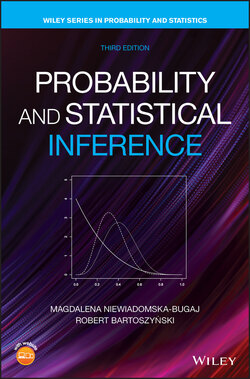Читать книгу Probability and Statistical Inference - Robert Bartoszynski - Страница 68
Chapter 3 Counting 3.1 Introduction
ОглавлениеIn the classical interpretation of probability, all outcomes of the experiment are equally likely, and the probability of an event is obtained as the relative frequency of outcomes that favor this event (imply its occurrence). Simple enumeration of elements in these sets is often not feasible, and therefore practical implementation of this principle requires developing techniques for counting elements of certain sets (e.g., sets of all possible outcomes of an experiment). The branch of mathematics dealing with such methods is called combinatorics, or combinatorial analysis. In this chapter, we introduce some combinatorial principles and illustrate their use in computing probabilities.
A much more complete presentation of combinatorial methods and their applications to probability can be found in Feller (1968).
